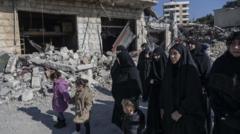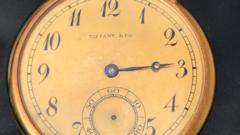Tensions Escalate as Israel-Hezbollah Ceasefire Hangs in the Balance
The fragile ceasefire between Israel and Hezbollah is being severely tested following a series of provocative exchanges that threaten to unravel the recent truce brokered by the US and France.
On Monday, Hezbollah fired two mortar shells at an Israeli military outpost in the sensitive Shebaa Farms area, prompting Israel to respond with its largest series of air strikes since the ceasefire took effect. The Israeli strikes resulted in nine deaths in two southern Lebanese villages, dramatically increasing tensions in the region.
The ceasefire agreement, established last Wednesday, includes specific conditions for both parties. Israel is prohibited from conducting offensive military operations in Lebanon, while Lebanon must prevent armed groups, including Hezbollah, from launching attacks on Israel.
Hezbollah claimed its mortar attack was a “warning” in response to repeated Israeli violations. The group stated that its action was defensive, citing futile attempts to stop Israeli attacks through international monitoring channels. Lebanese political figures suggest the missile launch was intended to demonstrate Hezbollah’s continued presence and capability.
Israeli leadership responded with strong rhetoric. Prime Minister Benjamin Netanyahu vowed a “strong” response, while Defense Minister Israel Katz warned that if the ceasefire collapses, there would be “no exemption for the state of Lebanon.” The Israeli military maintained that it targeted Hezbollah fighters, rocket launchers, and infrastructure while still claiming commitment to the ceasefire agreement.
Lebanon’s parliamentary speaker, Nabih Berri, alleged at least 54 ceasefire breaches by Israel, including air strikes, home demolitions, and airspace violations. Israel counters these claims by asserting that its strikes are responses to Hezbollah violations, including allegations of weapons movement south of the Litani River.
An international monitoring committee, co-chaired by a US army general and a senior Biden administration advisor, has been established to verify ceasefire claims and facilitate communication. The committee includes representatives from France, the Israeli and Lebanese militaries, and the UN Interim Forces in Lebanon.
Despite the recent escalation, White House national security spokesman John Kirby emphasized that the ceasefire is “largely holding,” noting a significant reduction in violence from hundreds of rocket attacks to essentially zero.
The situation remains precarious, with Lebanese independent parliamentarian Paula Yaacoubian suggesting that the potential resumption of war is “in the hands of Israel, not Hezbollah.” The international community continues to watch closely as the monitoring committee prepares to hold its first meeting and work to stabilize the fragile truce.
As tensions simmer, the region awaits the committee’s intervention and hopes for a peaceful resolution to the ongoing conflict.




